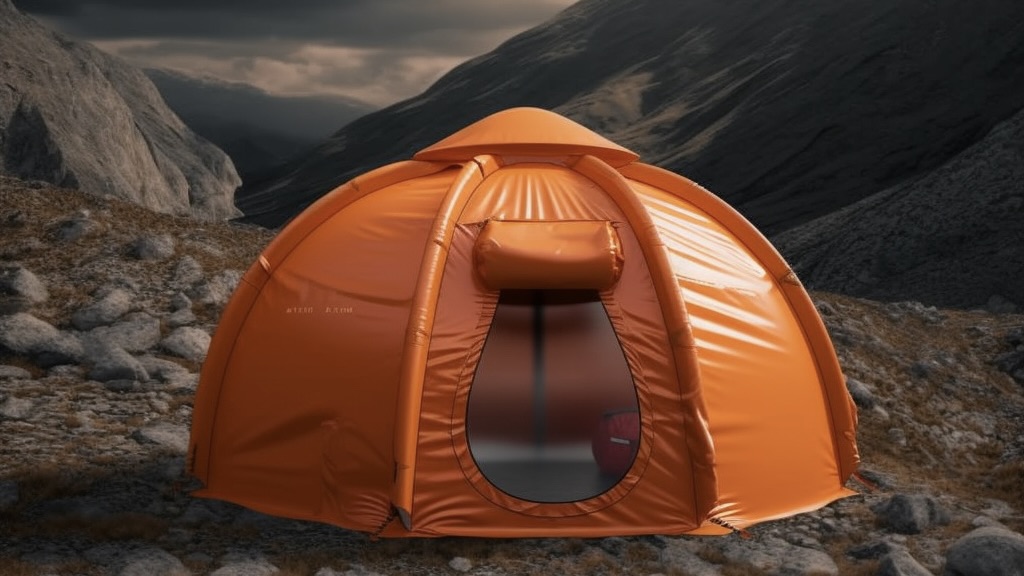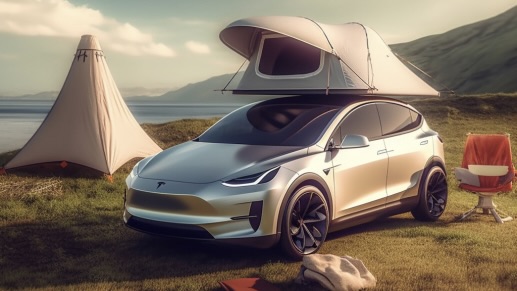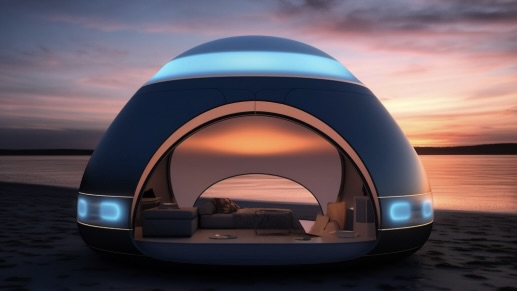Here’s a thought: would you sleep better in a lightning-proof tent?
We take a peek at what the future of camping equipment might look like

Our modern lifestyles and new technologies could influence – and predict – the type of camping and tents we will be enjoying in the future, suggests a new study.
The research reveals what campers could be seeing in tents in the years to come, such as lightning-proof tents, self-repairing tents and 'smart' tents.
Experts at CampingGuidance.com carried out the study to discover how tents of the future could solve all kinds of potential camping issues, such as extreme weather, equipment failing and increased safety. An AI illustrator tool was then used to show what each tent of the future might look like.
The lightning-proof tent
A lightning-proof tent is actually a real-life concept that didn’t receive funding to launch. While it’s unlikely that there is a tent that can be completely lightning-proof, certain materials and design features could help mitigate the risk of injury from a lightning strike.
The idea would be to construct the tent with a metallic framework, or use a metallic coating, so that this provides a path for the electrical current to follow to the ground. The frame would be continuous from the top to the bottom, with no gaps or insulators in between.
The material of the tent would be made from a synthetic or natural fibre material that is non-conductive, such as polyester or nylon. This means it will not conduct electricity, reducing the risk of injury to those inside.
Of course, it would be better to pitch your tent away from more lightning prone areas in the first place, such as in a low-lying area and away from tall trees.
Advnture Newsletter
All the latest inspiration, tips and guides to help you plan your next Advnture!

The self-repairing tent
It happens to so many people: as you set up your tent at a chosen location, part of the tent breaks or tears. A rip might also occur during bad weather.
And while many tents do come with rear kits, imagine a tent that can repair itself.
This idea might seem a bit fanciful – although the so-called Nano Cure Tent was a product that was launched as a Kickstarter project.
It was advertised as "the world's first self-healing tent” and was designed to repair small punctures and tears in the tent fabric without the need for patches or glue.
How can a tent be self-repairing, you might be thinking? Apparently, it was made from a special material that contained microscopic capsules of a fluid that could be activated by rubbing the affected area. When the capsules were ruptured, the fluid would be released and would flow into the puncture or tear, filling the hole and sealing it.
Now this is thought-provoking, since this kind of material could be used for a range of different outdoors equipment if it was ever to hit the market.

The all-season tent
The market is saturated with tents for all seasons and locations, but what is sometimes needed is a tent that is truly versatile for all eventualities.
The concept is a tent that is useful all year round and in both cold and warm environments.
So, in summer, the tent it would have an airy partial rainfly that's shorter and exposes more mesh for ventilation and, in winter, this could be changed to a full-length rainfly to cover the entire tent instead, to keep the warmth in. This could mean longer trips across countries and seasons with the same tent.
I guess you could do this with your own tent, too. If you’re feeling brave, you might want to strip off the outer fly sheet for fairweather camping.

The Tesla tent
This is one for fans of electric vehicles. It’s basically a roofbox tent – these are on the increase – but made specifically for electric cars.
The idea is that the Tesla tent needs to be compact and lightweight to suit a cars that rely on battery efficiency. So, it’s basically a smaller roofbox tent, then?!
We’re not so sure this idea can be classed as something of the future since roof box tents are already out there. Although, admittedly, most of them are heavy weight items.

The smart technology tent
Some tents already have smart elements, such as built-in speakers, but how about a next generation smart technology tent with Bluetooth connectivity, voice-activated controls for adjusting volume etc, built-in thermostats to automatically adjust the temperature, plus a fan or an air conditioning unit?
A smart tent could also be equipped with virtual assistants such as Google Assistant. This would allow campers to control various features of the tent with their voice, such as adjusting the temperature or turning on the lights.
Smart technology is everywhere these days – so a smart tent doesn’t seem that far fetched for the near future, although it won’t be the type of product you will want to pack for a lightweight wild camping trip!
Who knows what the next decades will bring for campers, but one things for sure, there will be ideas and details that take people by surprise.
- Best one-person tents: solo shelters perfect for camping and festivals

Fiona Russell is a widely published adventure journalist and blogger, better known as Fiona Outdoors. She is based in Scotland and is an all-round outdoors enthusiast with favorite activities including trail running, mountain walking, mountain biking, road cycling, triathlon and skiing (both downhill and backcountry). Aside from her own adventures, Fiona's biggest aim is to inspire others to enjoy getting outside and exploring, especially through her writing. She is also rarely seen without a running skort! Find out more at Fiona Outdoors.
